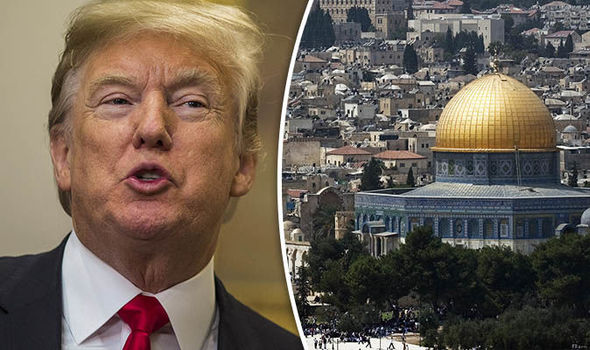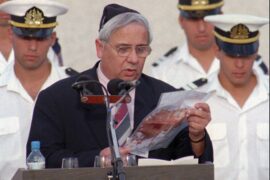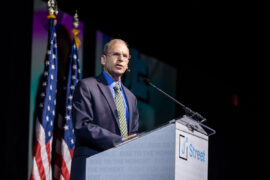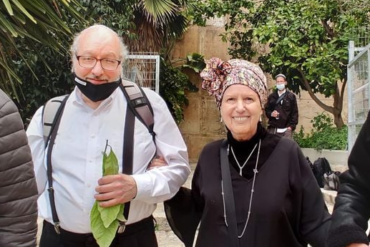Close to seventy years after the re-establishment of Jewish independence, the United States has taken official steps to recognize Jerusalem as Israel’s capital.
Ironically, this turn of events reveals a danger to Jewish liberation in the Jewish homeland. The problem, however, is not with America’s recognition of Jerusalem but rather in what the Jewish world’s reaction reveals about us and about the role we allow others to play in our story.
Jerusalem has been the Jewish people’s capital since King David established it as such approximately 3,000 years ago. After the Romans destroyed her, along with our civilization, the dream of rebuilding Jerusalem burned brightly in our minds and hearts all over the world.
Living as refugees in exile for generation upon generation, we continued to remind ourselves of the destruction of Jerusalem and of our desire to return and rebuild. Three times a day, after each meal, on every holy day and festival, and at every life cycle event, the Jewish people remembered Jerusalem.
In many ways, the dream of restoring Jewish independence to Jerusalem sustained us through our long and bitter exile. This dream began to materialize in 1948, when the Jewish people declared independence and affirmed Jerusalem as our re-established capital. But it was not until 1967 that the dream of returning to Jerusalem came to fruition, when Israel defeated the occupying Jordanian forces and liberated the Old City.
Our return to Jerusalem corrected a major injustice caused by the destruction and displacement of our people so many centuries earlier. But the dream of rebuilding and restoring Jerusalem to her former glory is not complete. Challenges still lie ahead, such as bringing security and equal treatment under the law to all of the neighborhoods of Jerusalem, unifying the Jewish and non-Jewish residents of the city, and bringing justice and peace to the Temple Mount.
The Jewish world’s reaction to the recent events surrounding Washington’s recognition of Jerusalem, however, puts into question whether we are currently capable of meeting these challenges and advancing our liberation struggle.
Jewish leaders have responded to President Donald Trump’s speech recognizing Jerusalem as the capital of Israel with unhealthy fervor. Some have even compared the US leader to King Cyrus, who our sages praise for decreeing that Jews could return to Jerusalem. The difference between Cyrus and Trump, however, is that Cyrus – at least at first – measurably advanced the Jewish liberation struggle.
Unlike Cyrus, who helped and encouraged us to take important steps to return to Jerusalem and to rebuild our Temple, all Trump has done is to simply acknowledge something that we have already accomplished without US assistance (and in such a way that further divided Israelis and Palestinians).
Our people liberated Jerusalem through the bravery and sacrifices of Jewish fighters who battled occupying British and Jordanian forces, in many instances against the objections and obstacles posed by the United States.
By awarding Trump such undeserved praise for his recognition of Jerusalem, we place our trust in US administrations rather than in ourselves. Today Washington gives us recognition but tomorrow it might take it away. Rather than taking responsibility for advancing our ancient dream of a truly restored and independent Jerusalem, we delegate this to foreign powers with questionable interests.
Moreover, by giving such weight and importance to the American President’s decision to recognize Jerusalem, we reinforce the perception that we are more interested in gaining favor with the West than with resolving our conflict with the Palestinians and becoming an organic part of the region.
Our over-reaction to US recognition encourages the role that we allow the West to play in our conflict and promotes the false narrative that Jews and Palestinians are engaged in a zero-sum game in which one party must win and one party must lose. This false narrative oppresses both Jews and Palestinians as it misleads us to see each other as enemies that must either be defeated or appeased through painful concessions.
By allowing foreign leaders to award wins and losses in our conflict, we reinforce the false either/or paradigm that continues to exacerbate the conflict while preventing us from tackling the real challenges standing in the way of our freedom.
The dream of a restored Jerusalem as capital of a revived independent Hebrew state sustained us through centuries of exile and persecution. Our ancient yearnings empowered us to return to our homeland, to revive our language, to rebuild our cities, and to force out a foreign empire.
The rebirth of our nation came at a high price paid by brave men and women that fought for Jewish independence. The liberation of Jerusalem resulted from decisive bold actions taken by the leaders of an independent nation. It makes no sense for us to look to the leaders of foreign powers to remove the remaining obstacles on our road to liberation.






Interesting thoughts
as an Israeli, I have the same fealing.
Why we (Israelis) always looking for others approved?